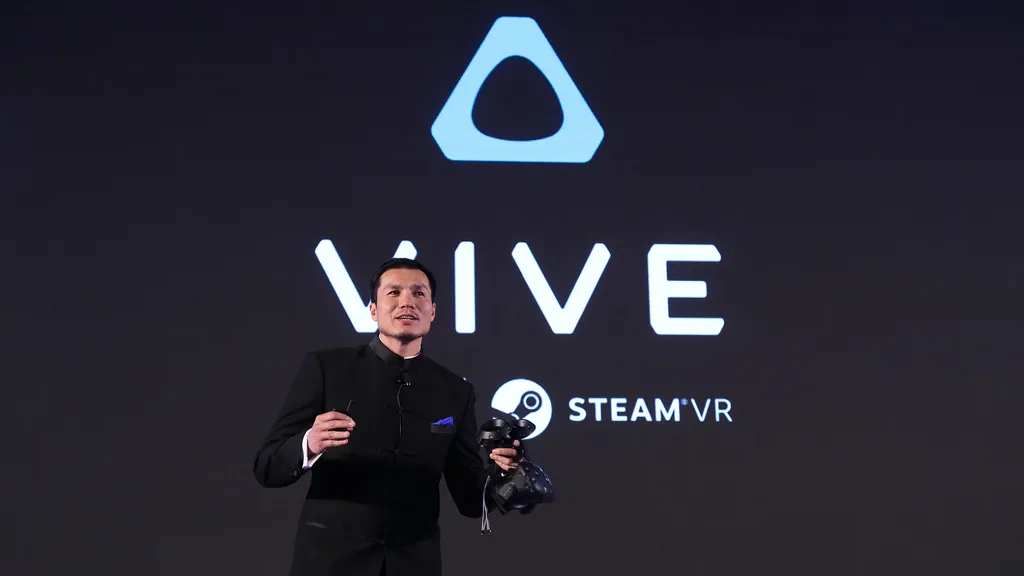Back in early May we reported on murmurs of HTC setting up a VR-based subsidiary, HTC Vive Tech Corporation, but we didn’t know much about it at the time. Today, we can confirm that HTC has indeed spun off its Vive business with an explanation straight from the horse’s mouth.
In a statement issued to UploadVR, HTC explained that the moved would help it build alliances and establish a “global VR ecosystem.” The full quote reads:
“HTC can confirm that it has established a wholly-owned subsidiary, HTC Vive Tech Corporation, as a vehicle for developing strategic alliances to help build the global VR ecosystem.”
It sounds like today’s announcement of the VR Venture Capital Alliance could be a good example of this. HTC is one of 30 companies that’s agreed to meet six times a year to view pitches from startup companies working in virtual, augmented and mixed reality and invest in them.
The move also has some wider implications, however, for which we’ve turned to industry analyst and Staff Technologist at Moor Insights & Strategy, Anshel Sag, to help explain. Sag notes that creating a seperate but “wholly owned” subsidiary would help HTC keep its financial data specific to VR seperate from the (currently) larger mobile division of HTC, avoiding confusion. It also helps to distance the product from that smartphone brand, which Sag says “has some negativity attached to it” due to past failures, despite the more recent success of the HTC M10.
“But this is also good for HTC’s investors because it means that HTC still owns the Vive VR division and can make lots of money from the growth of VR without having to worry about it dying on the vine from a lack of capital from HTC,” Sag continues. He even speculates that that the investment could become “the majority of HTC’s worth as a company” as VR continues to grow in importance.
We’ve also uncovered some of the leadership team behind the new subsidiary. Late last week HTC posted the agenda for its latest shareholder meeting online. On page 36 of that agenda you can find Supplement 8, a list of potential Directors and Supervisors up for election (or re-election in some cases) within the company. Each nominee has their current positions within HTC and other companies listed. A number of those sections include members of HTC Vive Tech Corporation. Namely, HTC CEO Cher Wang is Chairwoman of the group and director HT Cho holds the same position, as does director Wen-Chi-Chen.
It’s highly common for leaders of parent companies to assume similar positions within their subsidiaries, so it’s not surprising to see many of HTC’s key executives taking on these roles as Vive Tech Corporation. Interestingly, Wang is also Chairwoman of ‘HTC Vive Holding Corp’. Holding corporations are traditionally set up to hold shares within another company.
Alongside Sag’s comments, we also asked Tim Merel, Founder and Managing Director of VR and AR M&A advisory company Digi-Capital and and CEO of Eyetouch Reality, to explain why a long-established company like HTC might make this kind of move.
Merel had this to say:
When Facebook bought Oculus for $2 billion in 2014, it set a benchmark for the value of a very early stage VR hardware business. HTC announced the Vive a year later, and both products have now moved from prototype to consumer product stage. There is significant value both strategically and financially to HTC from the Vive.
HTC’s phone business is mature, while the Vive has just launched. The economics and management of mature and growth businesses are very different, so giving the Vive unit more autonomy and flexibility could enable it to grow that much faster. Similarly the financial flexibility of a separate subsidiary could be useful to maximizing value from that part of the business.
That’s a strand more light shed on what is a very mysterious element of HTC’s operations right now. In truth, Vive becoming its own subsidiary likely won’t make much visible difference to you as a consumer, but instead helps to streamline the company’s internal work with it. In the long-run, then, it might benefit Vive fans without them even realising the subsidiary exists.
Of course, the company as a whole is facing financial pressures right now in light of its struggling smartphone business, as Sag alluded to in his analysis. It’s an area that used to define HTC, but sluggish sales and the rise of VR have reshaped the company’s image somewhat in the past few months. HTC is no doubt planning for this subsidiary to play an essential part in helping the company get back on track in the years to come.


























